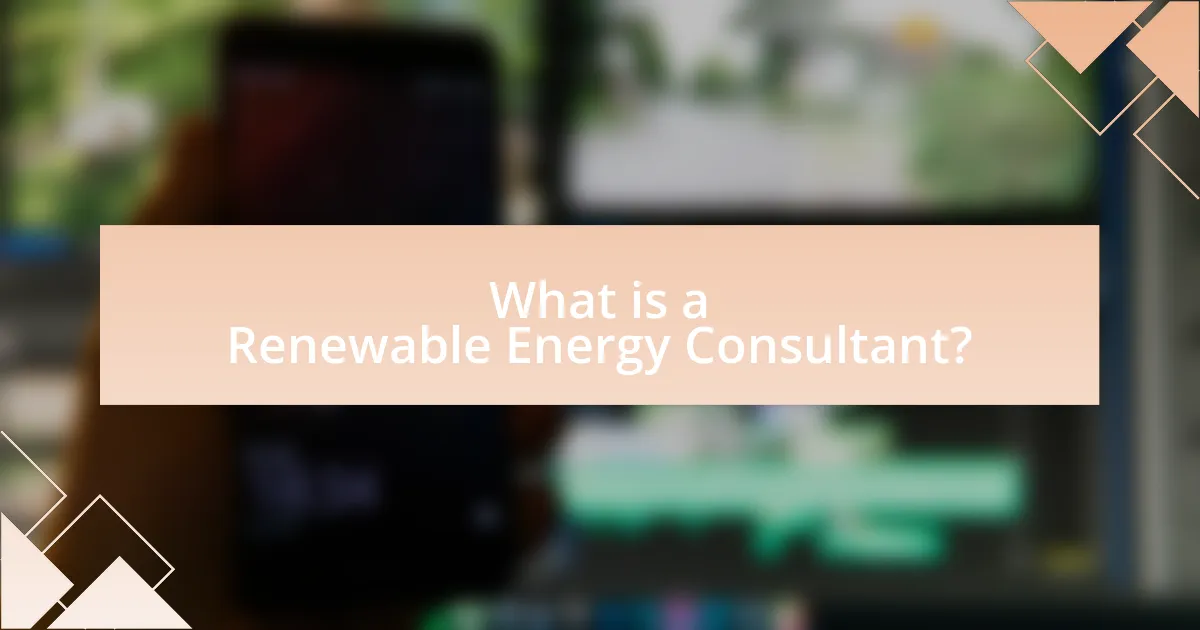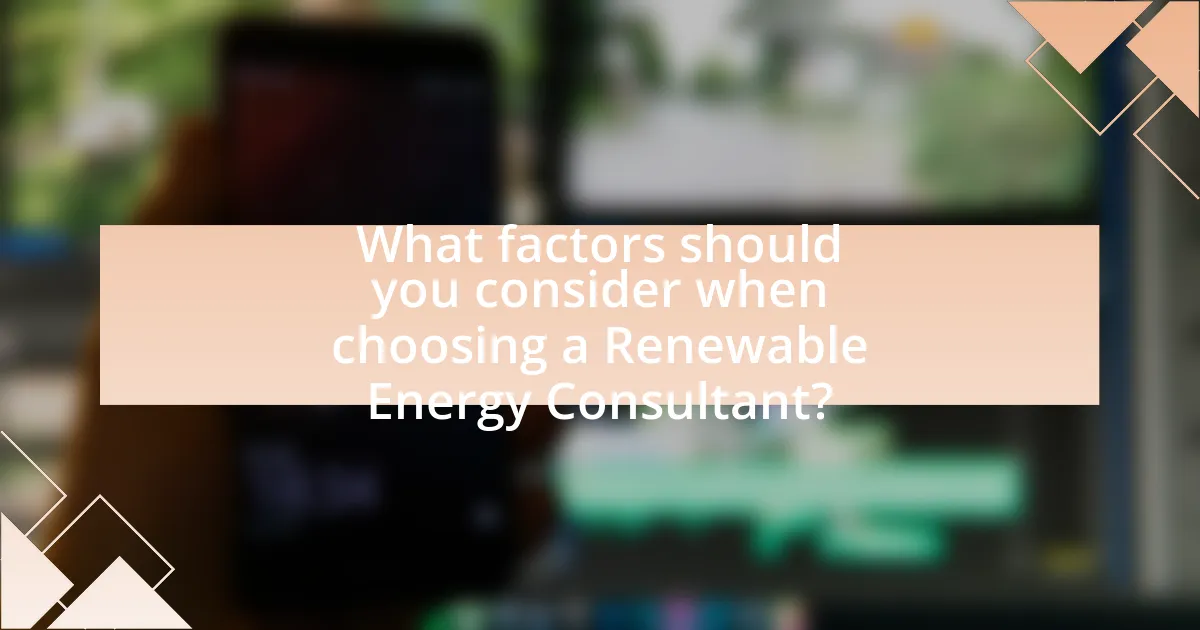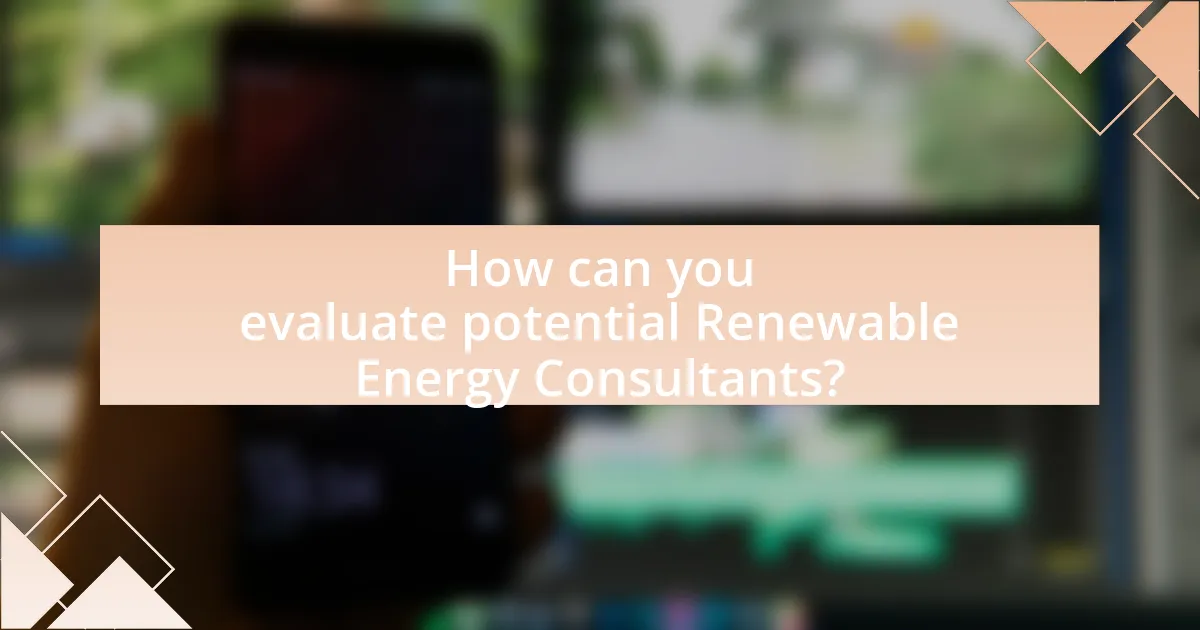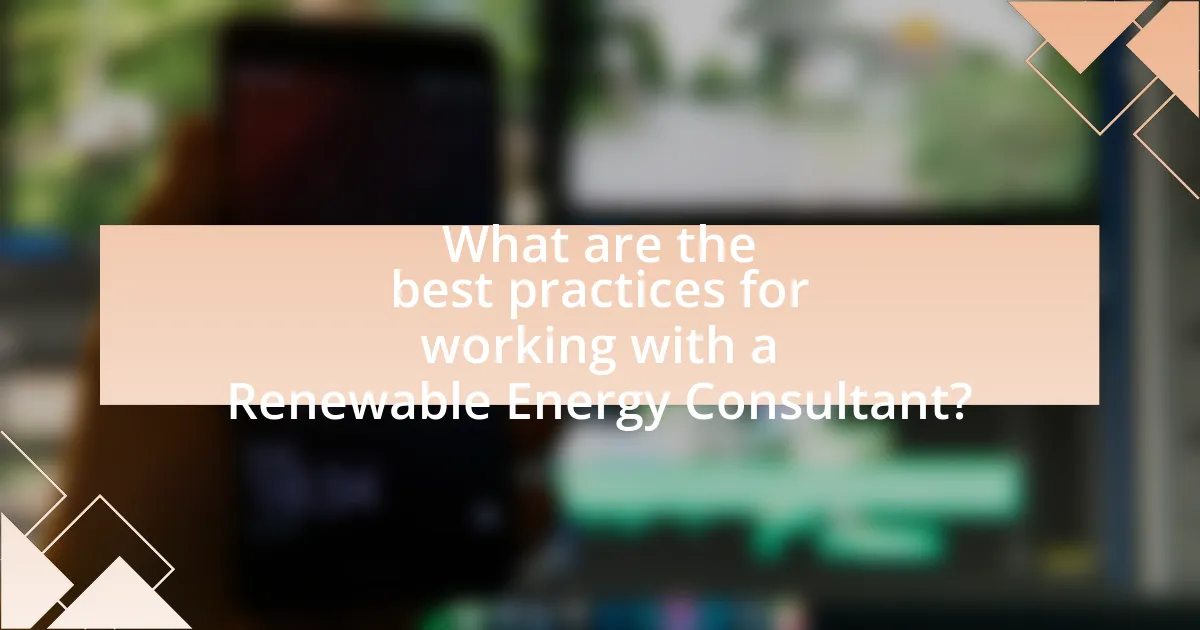A Renewable Energy Consultant is a professional who provides expert guidance on the development and management of renewable energy projects, helping businesses transition to sustainable energy solutions. This article outlines the critical factors for selecting the right consultant, including their expertise, experience, and the specific services they offer, such as energy audits and feasibility studies. It emphasizes the importance of tailored services for different industries, effective communication, and the consultant’s network in influencing project success. Additionally, it highlights best practices for collaboration and ongoing support to ensure successful implementation of renewable energy initiatives.

What is a Renewable Energy Consultant?
A Renewable Energy Consultant is a professional who provides expert advice and guidance on the development, implementation, and management of renewable energy projects. These consultants assess energy needs, evaluate renewable energy technologies, and help organizations transition to sustainable energy solutions. They often possess specialized knowledge in areas such as solar, wind, and biomass energy, and they may assist in regulatory compliance, financial analysis, and project feasibility studies. Their expertise is crucial for businesses aiming to reduce carbon footprints and enhance energy efficiency, as evidenced by the growing demand for renewable energy solutions in response to climate change and energy security concerns.
How do Renewable Energy Consultants assist businesses?
Renewable Energy Consultants assist businesses by providing expert guidance on the implementation and optimization of renewable energy solutions. They analyze a company’s energy needs, recommend suitable technologies such as solar, wind, or biomass, and help in the design and integration of these systems. Additionally, they assist in navigating regulatory requirements and securing financing options, which can significantly reduce operational costs and enhance sustainability. According to the U.S. Department of Energy, businesses that adopt renewable energy can save up to 30% on energy costs, demonstrating the tangible benefits of consulting services in this sector.
What specific services do they provide?
Renewable energy consultants provide services such as energy audits, feasibility studies, project management, and regulatory compliance assistance. These services help businesses assess their energy needs, evaluate renewable energy options, and implement sustainable solutions. For instance, energy audits identify energy consumption patterns and potential savings, while feasibility studies analyze the viability of specific renewable projects, such as solar or wind installations. Project management ensures that renewable energy projects are executed efficiently and within budget, and regulatory compliance assistance helps businesses navigate the legal requirements associated with renewable energy initiatives.
How do they tailor their services to different industries?
Renewable energy consultants tailor their services to different industries by conducting thorough assessments of specific industry needs and regulatory requirements. For instance, in the manufacturing sector, consultants may focus on energy efficiency and cost reduction strategies, while in the agricultural sector, they might emphasize sustainable practices and renewable energy integration for irrigation systems. This customization is supported by industry-specific data and case studies, demonstrating successful implementations that align with unique operational challenges and goals.
Why is it important to choose the right consultant?
Choosing the right consultant is crucial because their expertise directly impacts the effectiveness and success of your renewable energy projects. A qualified consultant brings specialized knowledge, industry experience, and a proven track record, which can lead to optimized solutions and cost savings. For instance, a study by the International Renewable Energy Agency (IRENA) highlights that businesses that engage experienced consultants can reduce project costs by up to 20% and improve project timelines by 30%. Therefore, selecting the right consultant ensures that your business benefits from informed decision-making and strategic planning in the renewable energy sector.
What impact does a consultant have on project success?
A consultant significantly enhances project success by providing specialized expertise and strategic guidance tailored to the project’s needs. Their involvement often leads to improved decision-making, risk management, and resource allocation, which are critical for achieving project objectives. For instance, a study by the Project Management Institute found that organizations utilizing external consultants reported a 20% higher success rate in project delivery compared to those relying solely on internal resources. This demonstrates that consultants can effectively bridge knowledge gaps and implement best practices, ultimately driving project outcomes.
How can the wrong choice affect your business?
The wrong choice of a renewable energy consultant can significantly impact your business by leading to inefficient energy solutions and increased costs. An unsuitable consultant may lack the necessary expertise, resulting in poor project execution and failure to meet regulatory requirements, which can incur fines or legal issues. For instance, a study by the National Renewable Energy Laboratory found that businesses that engaged inexperienced consultants faced up to 30% higher operational costs due to suboptimal energy strategies. Additionally, the wrong consultant may not align with your business goals, causing wasted resources and missed opportunities for savings and sustainability.

What factors should you consider when choosing a Renewable Energy Consultant?
When choosing a Renewable Energy Consultant, consider their experience and expertise in the specific renewable energy sector relevant to your needs, such as solar, wind, or biomass. A consultant with a proven track record in similar projects can provide valuable insights and effective solutions. Additionally, evaluate their certifications and qualifications, as recognized credentials indicate a level of professionalism and knowledge in the field.
Furthermore, assess their understanding of local regulations and incentives, which can significantly impact project feasibility and financial viability. A consultant familiar with the regulatory landscape can help navigate potential challenges and optimize benefits.
Lastly, consider their communication skills and approach to collaboration, as a consultant who can effectively engage with stakeholders and convey complex information clearly will enhance project success. These factors collectively ensure that the chosen consultant aligns with your business goals and can deliver effective renewable energy solutions.
How do you assess a consultant’s experience and expertise?
To assess a consultant’s experience and expertise, review their educational background, professional certifications, and relevant work history in the renewable energy sector. A consultant with a degree in environmental science or engineering, along with certifications such as LEED or PMP, demonstrates a solid foundation. Additionally, examining their portfolio for past projects, client testimonials, and case studies provides insight into their practical experience and success in similar projects. For instance, a consultant who has successfully managed multiple renewable energy installations can showcase their ability to navigate industry challenges effectively.
What qualifications should you look for?
When choosing a renewable energy consultant for your business, look for qualifications such as relevant educational background, industry certifications, and practical experience in renewable energy projects. A degree in environmental science, engineering, or a related field provides foundational knowledge, while certifications like LEED or NABCEP demonstrate specialized expertise. Additionally, experience in successfully completed projects indicates the consultant’s ability to navigate challenges and deliver results. For instance, a consultant with a proven track record in solar or wind energy projects can offer valuable insights and strategies tailored to your business needs.
How can you verify their past projects and success rates?
To verify a renewable energy consultant’s past projects and success rates, review their portfolio and client testimonials. A comprehensive portfolio should detail completed projects, including specific metrics such as energy savings achieved, project timelines, and client satisfaction ratings. Additionally, seeking third-party reviews or case studies published by independent organizations can provide unbiased insights into the consultant’s effectiveness. For instance, the National Renewable Energy Laboratory (NREL) often publishes case studies that highlight successful projects and their outcomes, which can serve as a reliable source of verification.
What role does communication play in the selection process?
Communication plays a critical role in the selection process of a renewable energy consultant by facilitating clear understanding between the business and the consultant regarding project goals, expectations, and deliverables. Effective communication ensures that both parties align on the scope of work, timelines, and budget, which is essential for a successful partnership. According to a study by the Project Management Institute, 90% of project success is attributed to effective communication, highlighting its importance in managing stakeholder expectations and minimizing misunderstandings.
How can effective communication enhance collaboration?
Effective communication enhances collaboration by ensuring that all team members clearly understand their roles, responsibilities, and objectives. When communication is transparent and consistent, it fosters trust and encourages open dialogue, which is essential for problem-solving and innovation. Research indicates that teams with effective communication are 25% more productive, as they can quickly address misunderstandings and align their efforts towards common goals. This alignment is particularly crucial in complex projects, such as those involving renewable energy consulting, where diverse expertise must be integrated to achieve successful outcomes.
What questions should you ask during initial consultations?
During initial consultations with a renewable energy consultant, you should ask questions that clarify their experience, approach, and understanding of your specific needs. Key questions include:
- What is your experience in the renewable energy sector, particularly with projects similar to ours?
- Can you provide references or case studies from past clients?
- What is your approach to assessing our energy needs and potential solutions?
- How do you stay updated on the latest technologies and regulations in renewable energy?
- What are the estimated costs and timelines for the services you provide?
- How do you measure the success of a renewable energy project?
These questions help ensure that the consultant has the relevant expertise and a clear strategy for addressing your business’s renewable energy goals.

How can you evaluate potential Renewable Energy Consultants?
To evaluate potential Renewable Energy Consultants, assess their qualifications, experience, and track record in the renewable energy sector. Start by reviewing their educational background and certifications, such as a degree in environmental science or renewable energy, which indicate a solid foundation in the field. Next, examine their professional experience, focusing on projects they have successfully completed, particularly those similar to your business needs. For instance, a consultant with a history of implementing solar energy solutions for commercial clients demonstrates relevant expertise. Additionally, seek client testimonials and case studies that highlight their problem-solving abilities and project outcomes. According to a report by the International Renewable Energy Agency, consultants with proven success in reducing energy costs and improving sustainability metrics are more likely to deliver value.
What criteria should you use for evaluation?
The criteria for evaluating a renewable energy consultant include expertise, experience, and client references. Expertise ensures the consultant possesses the necessary knowledge in renewable energy technologies and regulations, which is critical for effective project implementation. Experience, particularly in similar projects, indicates the consultant’s ability to navigate challenges and deliver results. Client references provide insight into the consultant’s reliability and performance, allowing businesses to gauge satisfaction levels from previous clients. These criteria collectively ensure that the selected consultant can meet the specific needs of the business effectively.
How do you compare proposals from different consultants?
To compare proposals from different consultants, evaluate criteria such as cost, expertise, project approach, and timelines. Each proposal should be assessed based on its alignment with your specific project needs and goals. For instance, a proposal that outlines a clear methodology and demonstrates relevant experience in renewable energy projects can indicate a higher likelihood of successful outcomes. Additionally, comparing the total cost against the value offered, including potential long-term savings and benefits, is essential. This structured approach ensures that you select a consultant who not only meets your budget but also possesses the necessary skills and experience to deliver effective solutions.
What red flags should you watch for during the evaluation?
During the evaluation of a renewable energy consultant, watch for red flags such as lack of relevant experience, poor communication skills, and absence of clear project timelines. A consultant with insufficient experience may not be familiar with industry standards or regulations, which can lead to project delays or compliance issues. Poor communication skills can hinder collaboration and result in misunderstandings, affecting project outcomes. Additionally, if a consultant cannot provide a clear timeline for project milestones, it may indicate disorganization or an inability to manage projects effectively. These factors can significantly impact the success of your renewable energy initiatives.
How important is the consultant’s network and partnerships?
The consultant’s network and partnerships are critically important for effective project execution and resource access. A well-connected consultant can leverage relationships with industry stakeholders, regulatory bodies, and technology providers to facilitate smoother project implementation and compliance with regulations. For instance, a study by the International Renewable Energy Agency (IRENA) highlights that consultants with strong networks can reduce project timelines by up to 30% through expedited approvals and access to innovative technologies. This demonstrates that a consultant’s connections directly impact the efficiency and success of renewable energy projects.
What benefits do strong industry connections provide?
Strong industry connections provide access to valuable resources, insights, and opportunities that can enhance business operations. These connections facilitate networking with key stakeholders, leading to potential partnerships, collaborations, and access to industry best practices. For instance, a study by the Harvard Business Review highlights that businesses with robust networks are 70% more likely to secure funding and investment opportunities, demonstrating the tangible benefits of strong industry ties.
How can partnerships influence project outcomes?
Partnerships can significantly influence project outcomes by enhancing resource sharing, expertise, and risk management. When organizations collaborate, they can pool financial, technical, and human resources, leading to more innovative solutions and improved project efficiency. For instance, a study by the Harvard Business Review found that strategic partnerships can increase project success rates by up to 30% due to the combined strengths of the partners. Additionally, partnerships allow for shared risk, which can lead to more ambitious project goals and better overall performance.
What are the common pitfalls to avoid when selecting a consultant?
Common pitfalls to avoid when selecting a consultant include failing to clearly define project goals, neglecting to check references and credentials, and overlooking the importance of cultural fit. Clearly defining project goals ensures that both the consultant and the business are aligned on expectations, which is crucial for success. Neglecting to check references and credentials can lead to hiring unqualified consultants, as verified experience and expertise are essential in the renewable energy sector. Additionally, overlooking cultural fit may result in poor collaboration and communication, which can hinder project progress. According to a study by the Institute of Management Consultants, 70% of consulting engagements fail due to misalignment in these areas, highlighting the importance of avoiding these pitfalls.
How can you prevent falling for misleading claims?
To prevent falling for misleading claims, verify information through credible sources and cross-check facts. Researching the credentials and track record of renewable energy consultants can reveal their reliability; for instance, consulting industry certifications or client testimonials can provide insights into their legitimacy. Additionally, being aware of common red flags, such as overly optimistic promises or lack of transparency, can help identify misleading claims. According to a study by the Consumer Federation of America, consumers who engage in thorough research are 60% less likely to be misled by false claims.
What should you be cautious about regarding pricing structures?
When evaluating pricing structures for renewable energy consultants, you should be cautious about hidden fees and variable pricing models. Hidden fees can significantly increase the total cost beyond initial estimates, leading to budget overruns. Variable pricing models may fluctuate based on market conditions or project scope, making it difficult to predict overall expenses. According to a study by the National Renewable Energy Laboratory, 30% of businesses reported unexpected costs due to unclear pricing structures in consulting agreements. Therefore, it is essential to thoroughly review contracts and seek transparency in pricing to avoid financial surprises.

What are the best practices for working with a Renewable Energy Consultant?
The best practices for working with a Renewable Energy Consultant include clearly defining project goals, maintaining open communication, and ensuring alignment on expectations. Clearly defined project goals help the consultant tailor their approach to meet specific needs, while open communication fosters collaboration and allows for timely adjustments. Additionally, aligning expectations regarding timelines, deliverables, and budget ensures that both parties are on the same page, reducing the risk of misunderstandings. These practices are supported by industry standards that emphasize the importance of collaboration and clarity in successful renewable energy projects.
How can you establish clear goals and expectations?
To establish clear goals and expectations, define specific, measurable, achievable, relevant, and time-bound (SMART) objectives for the renewable energy consulting project. This approach ensures that both the consultant and the business have a mutual understanding of the desired outcomes and timelines. Research indicates that organizations that set SMART goals are 30% more likely to achieve their objectives compared to those that do not. By documenting these goals and regularly reviewing progress, businesses can maintain alignment with the consultant, fostering effective communication and accountability throughout the project.
What should be included in a project scope document?
A project scope document should include the project objectives, deliverables, milestones, tasks, and the overall timeline. It defines the boundaries of the project by specifying what is included and excluded, ensuring all stakeholders have a clear understanding of the project’s goals and requirements. Additionally, it should outline the resources required, roles and responsibilities, and any assumptions or constraints that may impact the project. This structured approach helps in managing expectations and facilitates effective communication among team members and stakeholders.
How can you ensure alignment throughout the project?
To ensure alignment throughout the project, establish clear communication channels and set defined goals from the outset. Regularly scheduled meetings and updates facilitate transparency and allow for adjustments based on feedback. Research indicates that projects with consistent communication and defined objectives are 30% more likely to meet their goals on time and within budget, as shown in a study by the Project Management Institute. This structured approach fosters collaboration and keeps all stakeholders informed and engaged, ultimately leading to successful project outcomes.
What ongoing support should you expect from your consultant?
You should expect your consultant to provide continuous guidance, performance monitoring, and strategic adjustments throughout your renewable energy project. This ongoing support includes regular check-ins to assess project progress, updates on regulatory changes, and recommendations for optimizing energy efficiency. For instance, a study by the International Renewable Energy Agency indicates that effective consultant support can lead to a 20% increase in project efficiency through timely adjustments and expert insights.
How can you maintain a productive relationship post-project?
To maintain a productive relationship post-project, establish regular communication and feedback mechanisms. This ensures that both parties remain aligned on goals and expectations, fostering collaboration. Research indicates that ongoing engagement, such as scheduled check-ins or progress updates, enhances relationship longevity and effectiveness. For instance, a study by the Project Management Institute found that projects with consistent communication practices are 20% more likely to succeed in meeting stakeholder expectations.
What resources can they provide for future energy needs?
Renewable energy consultants can provide resources such as access to solar, wind, hydroelectric, and geothermal energy technologies to meet future energy needs. These consultants often have partnerships with technology providers and can facilitate the integration of these renewable sources into existing energy systems. For instance, according to the International Renewable Energy Agency, the global capacity for renewable energy has been increasing, with solar and wind energy leading the growth, indicating a shift towards sustainable energy solutions. This trend underscores the importance of utilizing renewable energy consultants who can guide businesses in adopting these technologies effectively.
What tips can help you make the best choice?
To make the best choice when selecting a renewable energy consultant for your business, prioritize consultants with proven industry experience and a strong track record of successful projects. Research their past work, client testimonials, and case studies to assess their expertise and reliability. For instance, a consultant who has successfully implemented renewable energy solutions for businesses similar to yours demonstrates relevant experience, which can significantly influence the effectiveness of their recommendations. Additionally, ensure the consultant is knowledgeable about the latest technologies and regulations in the renewable energy sector, as this knowledge is crucial for providing tailored solutions that meet your specific needs.